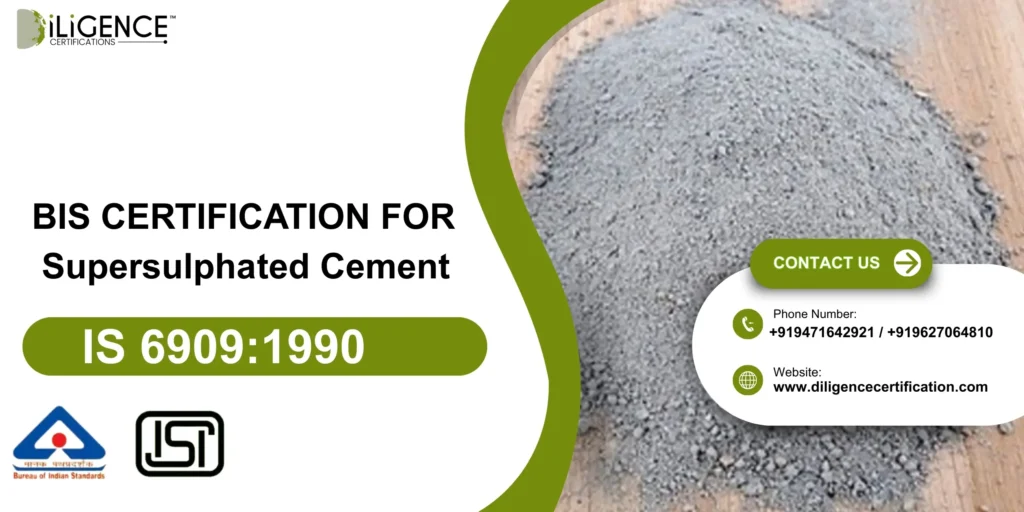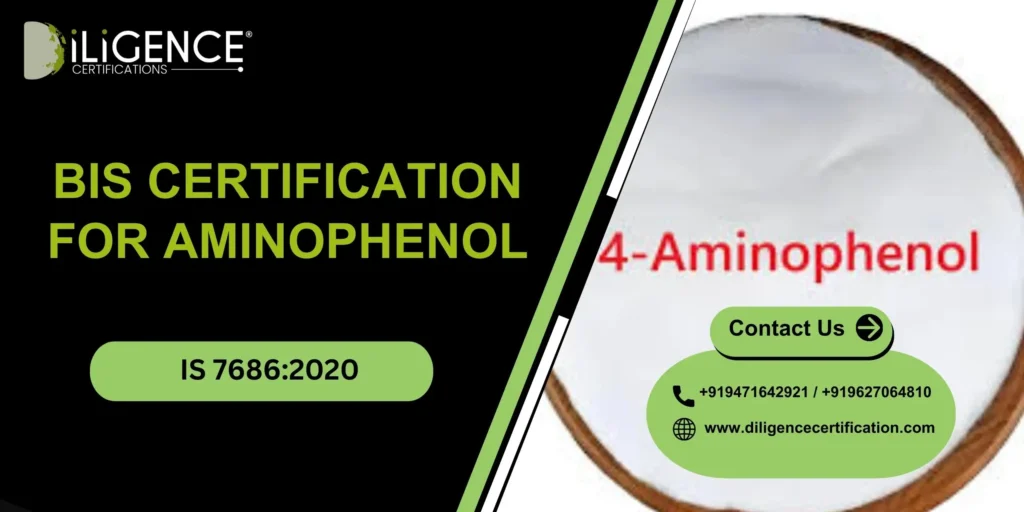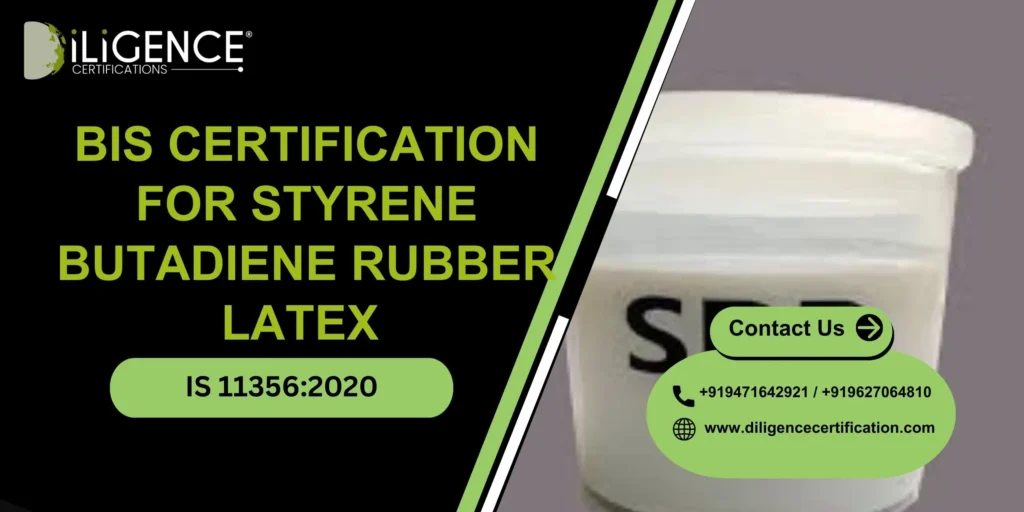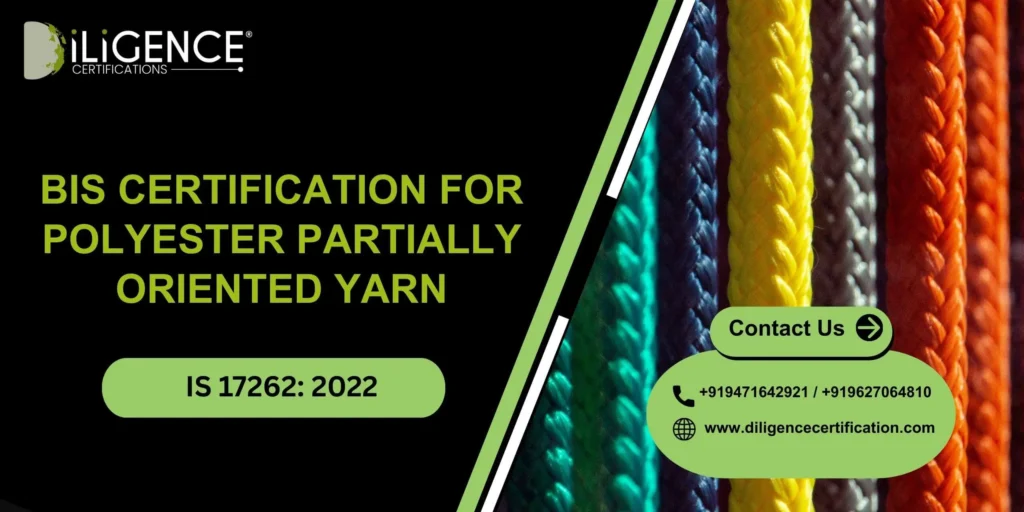- BIS certificate for Supersulphated Cement in discernment to the IS 6909:1990 Specifications is compulsory for production, import, and selling in India;
- The ISI Mark takes the responsibility of making sure our product meet chemical, physical and durability conditions particularly in respect to marine and sulphate media.
- The certification sequence involves applying, documenting, auditing the plant, testing the samples, and receiving the approval from the BIS.
- IF NOT, you risk the rejection of your shipment, fines, and disqualification from government opportunity
- Working with the professionals at Diligence Certifications will save you time, and ensure that you enter the Indian market as planned.
Introduction
In India, any cement product would not be allowed in Indian Market without a BIS certification for Supersulphated Cement. The BIS certification is issued under IS 6909:1990 and confirms that the materials meet safety, quality and usable life requirements. The ISI Mark for Supersulphated Cement is more than just to comply, it is a badge of recognition that developers, engineering community and Government Authorities actively search for.
Supersulphated Cement (SSC) is commonly used for marine structures, chemical plant construction, or other projects where sulphates are present in the environment, due to high resistance as well as being eco-friendly. Essentially, the Bureau of Indian Standards (BIS) has made it a statutory certification as part of regulating essential infrastructure.
This guide is to provide you with all the information you need to the Supersulphated Cement ISI Mark including how to go about it, the fees, benefits and compliance requirements.
What is BIS Certification for Supersulphated Cement?

BIS Certification for Supersulphated Cement is an endorsement by the Bureau of Indian Standards (BIS) that the cement meets the safety and quality requirements established under IS 6909:1990. When certified, manufacturers can put ISI Mark on their cement bags as a symbol of authenticity and its reliability in the Indian market.
For Supersulphated Cement, BIS certification covers:
- Composition requirement – correct ratios of slag, gypsum, and clinker
- Chemical properties – limits for sulphur trioxide, magnesia, and loss on ignition
- Physical performance – fineness, setting time, and compressive strength
Simply put, the Supersulphated Cement ISI Mark is assurance that the cement will provide durability, sulphate resistance and safety for use in critical civil infrastructure including dams, bridges and marine applications. Without it, the cement cannot be legally sold or imported in India.
IS Standards Under BIS for Cement:
| IS Code | Cement Type / Specification |
| IS 12330 | Sulphate Resisting Portland Cement |
| IS 12600 | Low Heat Portland Cement |
| IS 1489 (Part 1) | Portland Pozzolana Cement – Part 1 (Fly-ash based) |
| IS 1489 (Part 2) | Portland Pozzolana Cement – Part 2 (Calcined clay based) |
| IS 269 | Ordinary Portland Cement |
| IS 3466 | Masonry Cement |
| IS 455 | Portland Slag Cement |
| IS 6452 | High Alumina Cement for Structural Use |
| IS 6909 | Super Sulphated Cement |
| IS 8041 | Rapid Hardening Portland Cement |
| IS 8042 | White Portland Cement |
| IS 8043 | Hydrophobic Portland Cement |
| IS 8229 | Oil Well Cement |
| IS 16415:2015 | Composite Cement – Specification |
| IS 16993:2018 | Microfine Ordinary Portland Cement – Specification |
| IS 15895:2018 | High Alumina Refractory Cement |
Importance and Benefits of BIS Certification for Supersulphated Cement
- Legal Compliance – BIS certification is a legal requirement to sell Supersulphated Cement in India and worth checking for compliance with IS standards.
- Quality Assurance – Helps ensure that the cement will meet essential benchmarks of strength, durability and performance.
- Credibility with Buyers – Gives buyers, contractors and engineers assurance and confidence regarding safety assurance.
- Market Eligibility – Allows for participation in government tenders as well as large projects with institutional and other commercial clients.
- Brand Value – Positive impact on the brand and reputation of the manufacturer at both national and international level.
- Gives a Competitive Advantage – Certified Supersulphated Cement
is more prominent and attractive than any other non-certified products. More selling opportunities.
- Safety of Structure – Ensures measures long-term performance in high temperature / refractory applications.
- Regulatory Compliance – Reduces risk of penalties and market trade/ supply restrictions.
Why BIS Certification Is Mandatory for Supersulphated Cement Brands?
BIS Certification is a must for Supersulphated Cement brands, as it ensures that the cement follows Indian safety and quality standards. Without BIS, brands cannot sell legally in India, cannot supply to government or big projects, and may create uncertainty in customers’ minds. BIS assures the customer that the cement is suitable for high quality, durable and reliable use in critical construction.
Eligibility Criteria for BIS Certification – Supersulphated Cement
For Indian Manufacturers
- Must be a legally registered company in India.
- Should have a manufacturing unit for Supersulphated Cement.
- Factory must have an in-house quality testing laboratory.
- Must follow IS 6909:1990 standards during production.
- Need to maintain proper quality control procedures.
For Foreign Manufacturers
- Must be a legally registered business in the home country.
- Should have a production facility for Supersulphated Cement.
- Must comply with IS 6909:1990 requirements.
- Required to appoint an Authorized Indian Representative (AIR) to apply on their behalf.
- Need to get product samples tested in BIS-recognized labs in India.
BIS Certification Process for Supersulphated Cement
For Indian Manufacturers (ISI Mark Scheme)
- Identify IS Code – Apply under IS 6909:1990 for Supersulphated Cement .
- Online Application – Submit application via Manakonline portal along with required documents.
- Factory Setup – Ensure in-house lab facilities and proper quality control systems.
- Sample Testing – Cement samples are tested both in the in-house lab and BIS-recognized laboratory.
- BIS Inspection – A BIS officer visits the plant to verify manufacturing and testing processes.
- Grant of License – If compliance is met, BIS issues the ISI mark license.
For Foreign Manufacturers (FMCS Scheme)
- Application Submission – Apply under the Foreign Manufacturers Certification Scheme (FMCS).
- Authorized Indian Representative (AIR) – Appoint an AIR to act on your behalf in India.
- Sample Testing in India – Send product samples for testing at a BIS-recognized lab in India.
- BIS Factory Audit – BIS officials conduct a physical inspection of the overseas plant.
- Compliance Verification – Ensure conformity to IS 6909:1990 and BIS guidelines.
- License Grant – On approval, BIS issues the license to affix the ISI mark on High Alumina Cement bags.
Documents Required for BIS Certification of Supersulphated Cement
- Application Form – Duly filled BIS application via the Manakonline Portal.
- Factory Registration Documents – Incorporation certificate / GST certificate / Partnership deed / MSME certificate.
- Factory Layout Plan – Details of manufacturing unit, production line, and laboratory.
- Manufacturing Process Flow Chart – Step-by-step process of Supersulphated Cement production.
- List of Machinery & Equipment – Installed machines used in cement production.
- List of Testing Equipment – In-house lab details, testing apparatus, calibration records.
- Quality Control Documents – Internal test reports, quality manuals, and raw material records.
- Utility Documents – Electricity bill, water bill, etc., as proof of factory operation.
- Employee Details – Qualified technical staff and lab chemist details.
- Product Test Report – In-house and BIS-recognized lab reports proving compliance with IS standards.
- Trademark/Brand Certificate – Copy of registered brand/trademark (if applicable).
- Authorization Letter – If application is filed through a consultant/representative.
- Import-Export Documents (for Foreign Manufacturers) –
- Business License of the company
- Nomination of Indian Authorized Representative (AIR)
- Product test reports from BIS-approved labs
Common Challenges in BIS Certification for Supersulphated Cement
Despite its benefits, manufacturers often face these roadblocks:
- Testing Delays from overloaded labs
- Non-Conformity During Audit
- Improper Documentation
- Infrastructure Gaps in Lab Setup
- Lack of Regulatory Understanding
Partnering with experienced consultants like Diligence Certifications can cut approval time by 40%.
The Costs of BIS Certification for Supersulphated Cement
BIS certification costs for Supersulphated Cement usually represent the filing of the application, mandatory product tests accomplished at a BIS accredited laboratory, factory inspections and maintaining the license. The actual costs depend on factors, including the size of the plant, the extent of testing and the compliance readiness.
Why Choose Diligence Certification?
For compliance and credibility, Diligence Certification is much more than a simple checklist — it provides true confidence in your business.
Diligence Certification encompasses all facets of making sure your business is ethical, responsible, and aligned with laws and industry best practices. It examines your company’s legal, financial and operational status — meaning that you are not just certified, but trusted.
Here’s why businesses rely on Diligence Certification:
- Stronger Risk Protection
It helps you spot hidden legal, financial, or operational risks early — so you can fix problems before they become threats. - Earn Stakeholder Trust
From investors to customers, people want to work with businesses that play by the rules. Diligence Certification proves you’re one of them. - Stay Legally Aligned
It makes sure your company is complying with laws not just regarding your products, but also labor laws, environmental laws, tax laws, and more. - Enhance Your Brand Reputation
Consumers respect ethical, transparent businesses. Diligence Certification shows the world that you operate with integrity.
- Stand Out from Competitors
In a crowded market, credibility is your biggest edge. Certification helps position your brand as reliable and responsible — not just another name.
Conclusion
BIS Certification for Supersulphated Cement is more than just a legal requirement. It is an indication of Trust, Safety, and Acknowledgement in the Market. No manufacturer can sell or even distribute cement for sale in India without this certification, be it for commercial or Government associated potential projects with large Infrastructure contracts.
In conclusion, by fulfilling eligibility requirements, requesting documentation, and progressing through the BIS process sequentially, businesses can ensure compliance and develop long standing credibility in the market.
If you happen to be a SSC cement manufacturer or importer wishing to simplify your certification journey, then by way of expertise, money, time, and effort will be saved.
Frequently Asked Questions
Are there any mandatory requirements for Supersulphated Cement (SSC) to have BIS Certification in India?
Yes, in accordance with BIS regulations, Supersulphated Cement must qualify for the requirements as specified in IS 6909:1990 and carry the required ISI Mark before sale or import.
What is IS 6909:1990?
IS 6909:1990 is the Indian Standard for Supersulphated Cement and specifies chemical, physical and performance criteria.
Who issues the BIS Certification?
The Bureau of Indian Standards (BIS) provides the certification after specified tests and inspections.
Can overseas manufacturers apply for BIS Certification?
Yes. An overseas manufacturer can apply via their Indian Authorised Representative (AIR) and follow the same certification process.
How long does it take to have the BIS Certification granted?
As a guide, Indian manufacturers will usually take 4-6 weeks and foreign clients 8-12 weeks.
What documentation needs to be provided for BIS Certification?
The main documents to be provided at the application and testing phase will include factory licence, quality test documents, process flow chart, calibration certificates, etc
Why is the ISI Mark on Supersulphated Cement important?
It creates confidence in consumers and customers, compliance with the law and allows Supersulphated Cement to be eligible for government projects.
What happens if I sell SSC and I am not BIS Certified?
The Authority may confisticate the product and impose fines. The trading company may be prohibited from taking part in any tenders with the Government or future imports.
What is the typical application of Supersulphated Cement?
Supersulphated cement has high durability and is therefore used in marine structures, chemical plants and sulphate-rich environments.
How can Diligence Certifications assist in the BIS Approval Process?
We will assist you with your entire approval process from the application filing process to support for audits to help you get certified fast and easy.


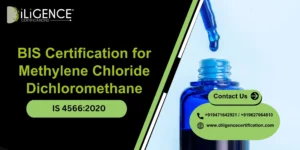
 BIS Certification
BIS Certification
 CDSCO
CDSCO
 CPCB
CPCB
 LMPC
LMPC
 WPC Approval
WPC Approval
 Global Approvals
Global Approvals
 TEC
TEC
 ARAI
ARAI
 BEE
BEE
 ISO Certification
ISO Certification
 Drone Registration
Drone Registration
 NOC For Steel
NOC For Steel



















 Business Registration
Business Registration














 Legal Services
Legal Services
 Trademark Registration
Trademark Registration
 Copyright Registration
Copyright Registration
 Patent Registration
Patent Registration
